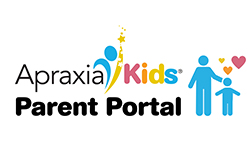Language processing refers to the mental operations by which we perceive, recognize, understand and remember sounds, words, and sentences. Because it happens “inside the head,” language processing can’t be seen directly, instead, we have to test for processing problems.
It’s natural to focus on the speech production difficulties of children with CAS, but there are good reasons for parents and clinicians to take a careful look at their comprehension and processing. For one thing, speaking and understanding are tightly linked; in fact, one influential theory suggests that our knowledge of speech movements helps us perceive speech sounds. For another, children who have processing and comprehension problems often “get by” in everyday situations by using their knowledge and previous experiences to help them understand at least when they are young. But as they get older, they face more and more situations in which there are no extra clues to comprehension, and even mild processing difficulties can slow down their understanding and interfere with their performance.
Some “Symptoms” of comprehension and processing problems:
- The child may understand single words, and have an excellent vocabulary, but have difficulties in understanding phrases or sentences. Because comprehension can be so variable, others may think that the child is “just not trying” or “not paying attention.”
- The child’s understanding will likely be better in everyday situations than in situations where there are few or no extra clues to meaning. In such situations, the child may fail to respond, may repeatedly say “Huh?, may simply guess what has been asked, or may even repeat some or all of what was said.
- Lengthy, complex, and abstract sentences are especially difficult for children with processing problems, especially if presented at normal or faster speaking rates.
If your child has normal hearing but you suspect a processing problem, a speech-language pathologist can assess his or her skills in single-word and sentence comprehension, as well as in phonological processing and phonological memory.
Some suggestions for parents whose children have processing problems:
- Draw your child’s attention to speech sounds in words, using rhyming and silly sound games. Point out how new sounds and words are similar to and different from sounds and words your child knows well.
- Don’t pretend you understand when you don’t. Show your child that communication breakdowns happen to everybody, and that people have to work together to fix them. Children who are at least 5 years old can be taught to monitor their comprehension, and to know what to do when they fail to understand.
- When possible, be face-to-face when talking to your child. Speaking at an unhurried rate, repeating key words and important information.
- Try not to give too much information at once. Rather than saying, “Get your coat on because we’re going to stop by Grandma’s house to pick up her dry cleaning after we pick up some things from the grocery store and pick up your brother from soccer,” you can say, “Let’s get your coat on. We have 3 things to do today. First, we are going to pick up your brother from soccer. Then I need to go to the grocery store to pick up food for our dinner. After that, we can stop by Grandma’s to pick up her dry cleaning.”
- Children who have difficulty with language processing and comprehension may become frustrated or worry about disappointing people when they are given instructions to follow that are too long or complex. You can simplify your instructions by giving one or two instructions at a time rather than a big list of things to do. When you give instructions, you can do a quick comprehension check by asking your child to retell the instructions. You also can ask your child to check in with you after they have completed an instruction. For instance, if you’re taking your child to the park, but they need to do a few things before you leave, you can tell your child, “We’re going to the park. Please put your puzzles back on the shelf. Where do your puzzles go?” “On the shelf.” That’s right. Let me know when you’re done… Great! Thanks for cleaning up your puzzles. Go upstairs and put on the shorts and t-shirt I set on your bed. Let me know when you’re dressed… Oh good. Wash your hands, and then we can go to the park.”
- When reading books, stop periodically and ask questions or have short discussions about what you’re reading. If possible, make connections between what you’re reading and your child’s life. Some books for children may contain complex sentence structures and sophisticated vocabulary. Consider rewording complicated sentences while reading aloud to your child. Don’t hesitate to stop and explain the meaning of words that may be unfamiliar to your child.
By Chris Dollaghan, Ph.D., CCC-SLP
